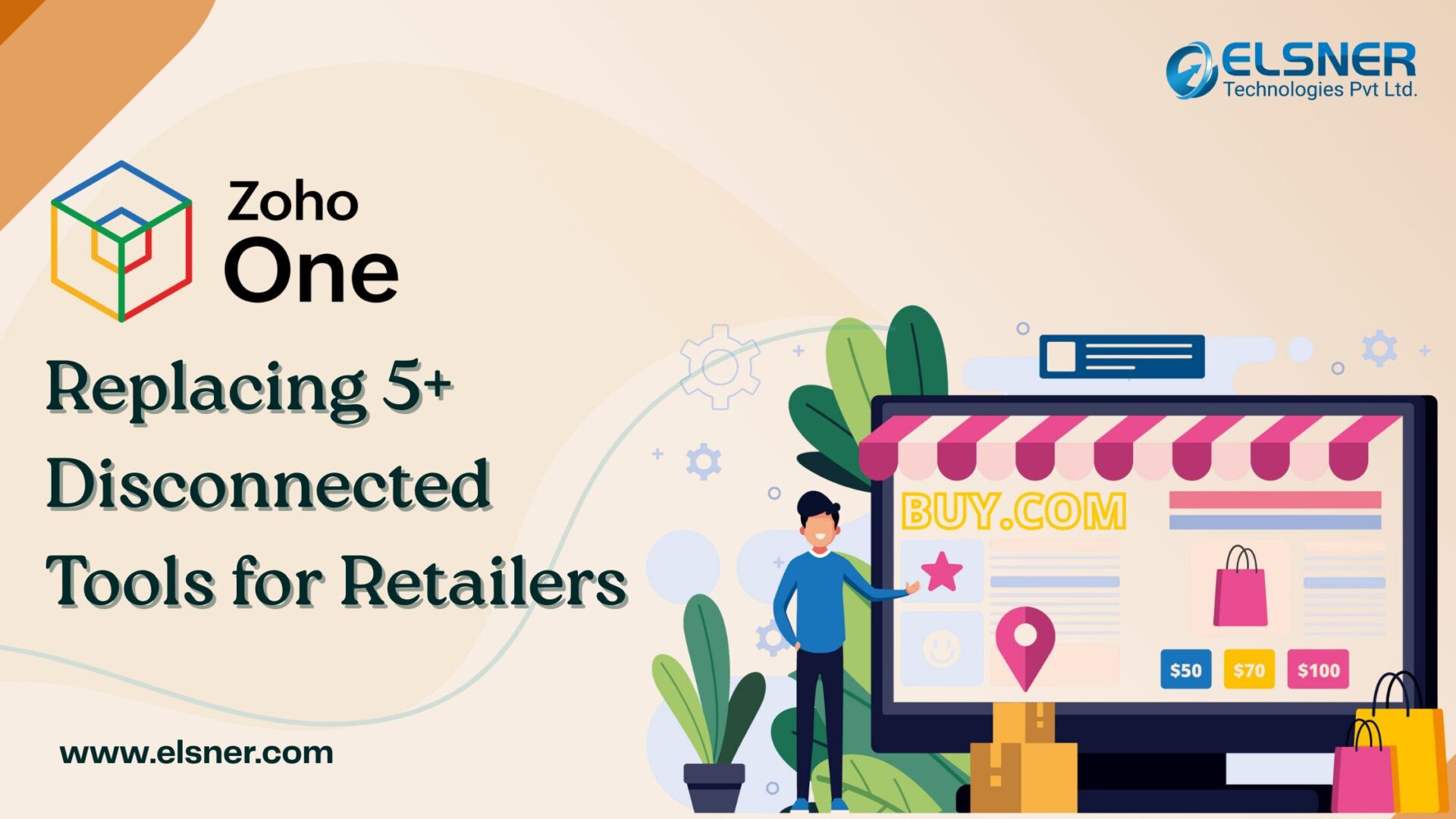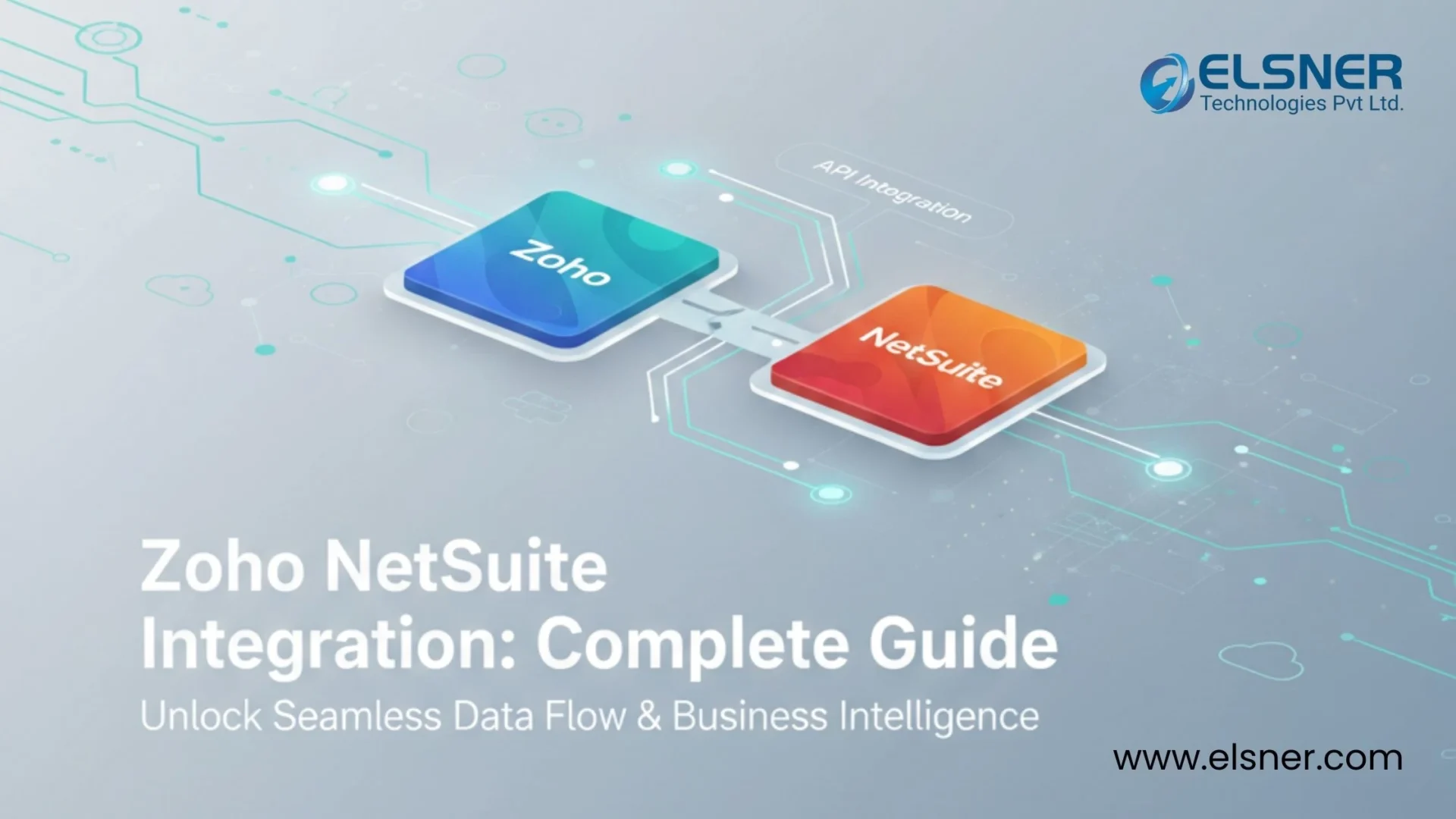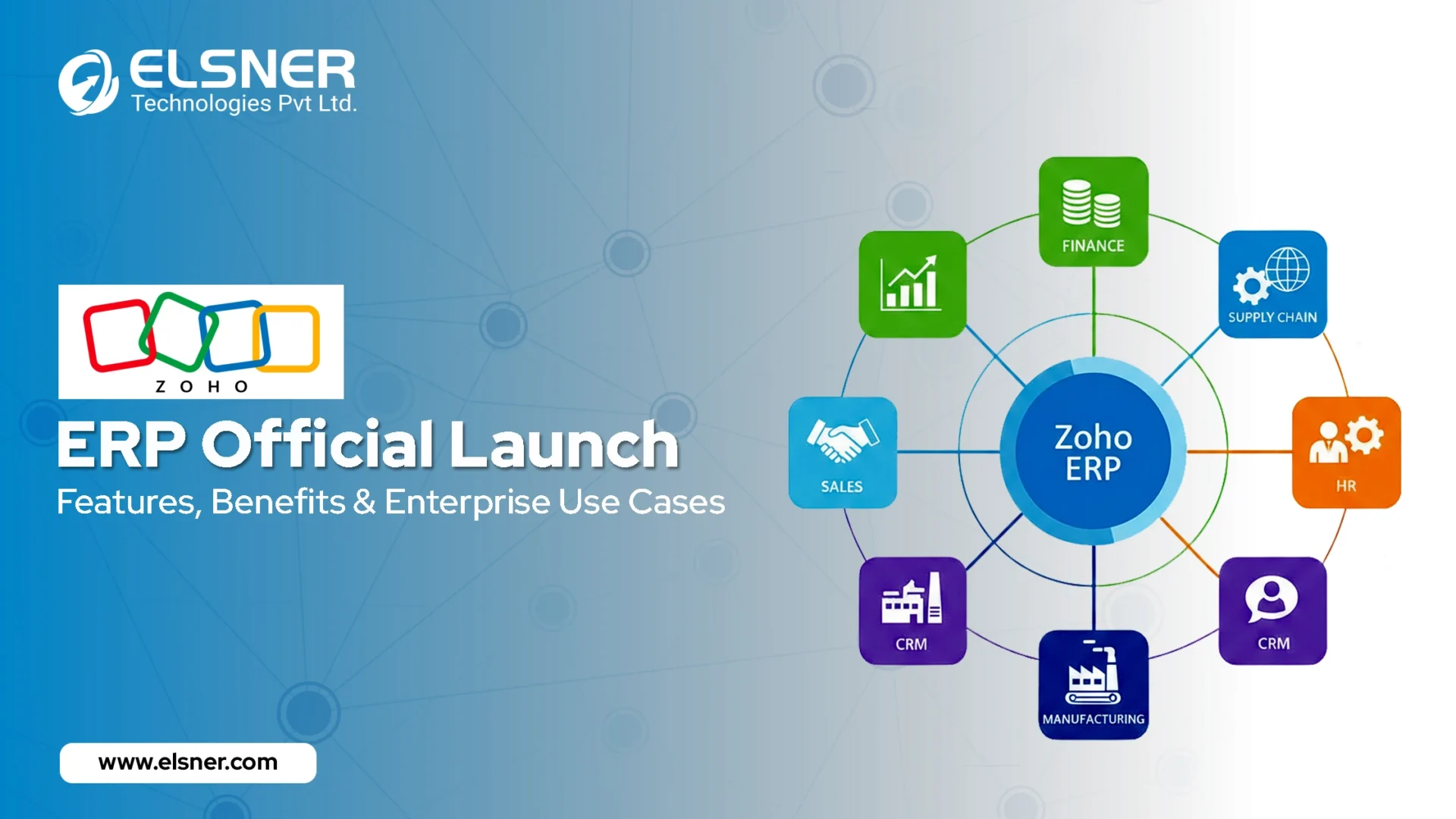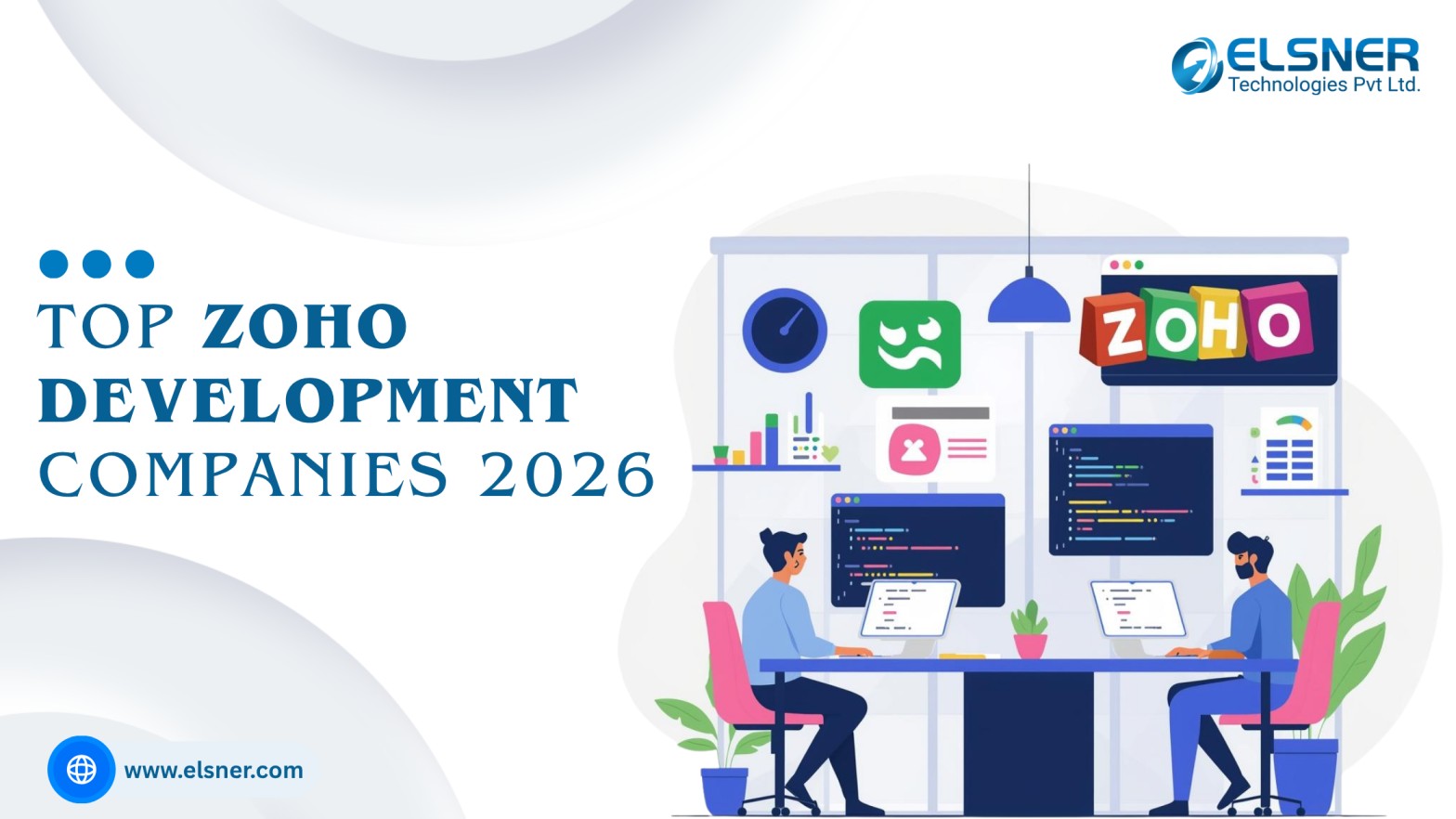- The Hidden Costs of Tool Fragmentation
- When Data Lives in Isolation
- The Productivity Drain Nobody Talks About
- Subscription Creep and Hidden Expenses
- What Is Zoho One & Why It’s a Game-Changer for Retail?
- Everything Connects, Everything Flows
- Start Small, Scale Smart
- Cloud-Based Accessibility That Actually Works
- Get Your Free Zoho Consultation
- Tool Replacement Made Simple
- Common Software Swaps
- Workflow Examples: How Retailers Use Zoho ERP Software in Practice?
- Streamlined Order Processing
- Smart Customer Communication
- Proactive Inventory Management
- Custom Automation with Advanced Tools
- Why Work with a Certified Zoho Development Company like Elsner?
- Retail-Focused Customization
- Proven Integration Experience
- Ongoing Optimization and Support
- Why Smart Retailers Choose Integration Over Fragmentation?
- FAQs
- Will Zoho One actually work for both online and physical stores?
- Can small chains with just a few locations really benefit from this?
- What about existing Zoho CRM users—does everything start from scratch?
- How long does implementation really take?
Disconnected tools create invisible barriers that slow down everything from inventory decisions to customer service responses. What should take minutes stretches into hours. Simple tasks become complex workflows involving multiple platforms and manual data entry.
This tech chaos caused by disconnected tools can be very expensive. Zoho One offers a different approach entirely. Instead of patching together separate software solutions that barely communicate, smart retailers are discovering how one integrated platform can replace their entire fragmented tech stack while actually improving performance.
Today’s blog will talk about how you can replace disconnected tools with Zoho One and the role of a Zoho development company in the process.
The Hidden Costs of Tool Fragmentation
Most retail decision-makers focus on obvious expenses like monthly subscriptions. However, the real damage runs much deeper than line-item costs on financial statements.
When Data Lives in Isolation
Customer information scattered across platforms creates blind spots that hurt business performance. Consider what happens during peak shopping seasons:
- Inventory levels shown on websites don’t match warehouse reality
- Customer service teams lack context about recent interactions
- Marketing automation triggers based on incomplete customer profiles
- Financial reporting requires manual data compilation from multiple sources
The Productivity Drain Nobody Talks About
Staff members waste countless hours on data entry tasks that should happen automatically.
- Order information gets typed into inventory systems,
- then re-entered into accounting software, and
- manually updated in customer service platforms.
This repetitive work introduces errors that compound across systems. A single mistake in product codes or customer details can trigger
- shipping delays,
- billing issues, and
- customer complaints.
41% of employees at small and medium-sized businesses still move data manually between systems.
Subscription Creep and Hidden Expenses
Software costs expand gradually as businesses add specialized tools for specific functions. What starts as a $50 monthly CRM subscription grows into:
- Email marketing platform: $120/month
- Inventory management system: $250/month
- Customer support software: $150/month
- Accounting solution: $80/month
- HR and payroll tools: $200/month
Additionally, each tool requires training, maintenance, and often expensive integration work. A Zoho development company can help you overcome such disconnected systems and build an integrated architecture.
Businesses with well-integrated systems enjoy a 73% higher average order value compared to those with poor integration.
What Is Zoho One & Why It’s a Game-Changer for Retail?
Rather than patching together multiple software solutions, Zoho One provides a comprehensive business platform designed for modern retail operations.
Everything Connects, Everything Flows
The Zoho ERP Software includes over 45 applications that share data seamlessly. When customers place orders:
- Inventory updates automatically.
- Sales information flows directly into financial reports.
- Customer service tickets include complete interaction histories.
This unified approach eliminates the data silos.
Start Small, Scale Smart
Zoho One doesn’t force businesses to adopt every application immediately. Retailers typically begin with core functions like:
- Customer relationship management through Zoho CRM services
- Inventory tracking
- Basic accounting features
- Email marketing capabilities
For businesses looking to get started, Zoho CRM and Marketing Plus provides the perfect entry point before expanding into additional Zoho ERP applications. Additional Zoho ERP software integrates smoothly as business needs evolve.”
Cloud-Based Accessibility That Actually Works
Team members access business data from any device without complicated VPN setups or server maintenance.
- Warehouse staff check inventory levels on mobile devices.
- Sales representatives update customer information during client visits.
- Management reviews performance dashboards from anywhere using.
The Zoho ERP Software infrastructure handles security, backups, and updates automatically.
Get Your Free Zoho Consultation
Tired of juggling multiple disconnected tools? Discover how Zoho One can unify your retail operations and save time, money, and resources.
Tool Replacement Made Simple
Understanding exactly which applications Zoho One can replace helps retailers visualize the consolidation process clearly.
Common Software Swaps
|
Business Function |
Common Tool Used | Zoho One App Equivalent |
Added Benefits with Zoho One |
|
CRM |
Salesforce, HubSpot | Zoho CRM |
Integrated with marketing, sales, and support |
|
Accounting |
QuickBooks, Xero | Zoho Books |
Automated GST, bank feeds, and invoices |
|
Email Marketing |
Mailchimp, Constant Contact | Zoho Campaigns |
CRM integration + better personalization |
|
Team Collaboration |
Slack, Trello | Zoho Cliq & Zoho Projects |
Unified communication and project tracking |
|
Inventory Management |
TradeGecko, Zoho Inventory | Zoho Inventory |
Real-time tracking, order sync with CRM |
|
HR & Attendance |
BambooHR | Zoho People |
Payroll, leave, and shift management |
Workflow Examples: How Retailers Use Zoho ERP Software in Practice?
Concrete examples demonstrate how Zoho One and Zoho ERP Software transform daily operations beyond simple tool consolidation.
Streamlined Order Processing
Online orders trigger automatic workflows that update multiple systems simultaneously:
Traditional Process:
- Customer places an order on the website
- Staff manually enter orders into the inventory system
- The accounting team creates an invoice separately
- The shipping department prints labels manually
- Customer service updates tracking information
Zoho One Process:
- Customer places an order online
- Inventory automatically adjusts across all sales channels
- The invoice is generated through Zoho Books integration
- Shipping labels print automatically with tracking codes
- Customers receive automated updates without staff intervention
Smart Customer Communication
Abandoned shopping carts trigger personalized email sequences based on browsing history and purchase patterns stored in Zoho CRM services.
The system:
- tracks customer engagement levels and
- adjusts messaging timing automatically.
For example, Zoho CRM developers can help you create different communication automation workflows for high-value customers and first-time visitors.
Proactive Inventory Management
Stock levels update in real-time across all stores and listings. A Zoho Partner can help you create the following workflows for proactive inventory management:
- Purchase orders are generated automatically for approved suppliers
- Sales teams receive notifications about potential stockouts
- Marketing campaigns pause for affected products
- Alternative product suggestions appear on websites
Custom Automation with Advanced Tools
Zoho Flow creates sophisticated workflows that connect different applications based on specific business rules.
Zoho CRM developers build custom applications for unique requirements like:
- Loyalty program management
- Vendor performance tracking
- Custom reporting dashboards
- Specialized customer journey mapping
Ready to see these workflows in action? Elsner specializes in designing retail-specific automations that maximize operational efficiency.
Why Work with a Certified Zoho Development Company like Elsner?
Successfully deploying Zoho One requires expertise in both the platform capabilities and retail industry requirements.
Retail-Focused Customization
A Zoho development company brings specialized knowledge of retail operations and common industry challenges. The implementation process includes:
- Detailed analysis of current workflows and pain points
- Custom configuration matching specific business processes
- Integration planning for existing systems and data migration
- Staff training programs tailored to different user roles
Proven Integration Experience
The team has successfully connected Zoho One with various retail technologies:
- Major POS systems (Shopify POS, Lightspeed)
- eCommerce platforms (WooCommerce, Magento)
- Marketplace integrations (Amazon, eBay, and Etsy)
- Existing ERP systems during transition periods
Ongoing Optimization and Support
Implementation represents the beginning of the Zoho One journey rather than the end:
- Regular system health checks and performance optimization
- New feature rollouts and capability expansions
- Advanced workflow development as business needs evolve
- Zoho Partner support for technical issues and user questions
When you hire Zoho developers, you gain access to continuous improvement opportunities for your business.
Why Smart Retailers Choose Integration Over Fragmentation?
Retailers who have integrated the Zoho ERP software system respond faster to market changes and serve customers more effectively.
The retail landscape rewards agility above almost everything else. Fragmented systems simply cannot deliver the capabilities consistently. They create bottlenecks exactly where businesses need speed and accuracy most.
Ready to eliminate operational friction? Book a Free Zoho Partner Consultation with Elsner and see how integrated systems transform retail performance.
FAQs
Will Zoho One actually work for both online and physical stores?
Zoho One handles hybrid retail operations without the usual complications. When someone buys a product online, the inventory automatically adjusts for all sales channels—website, physical stores, and marketplace listings.
Can small chains with just a few locations really benefit from this?
Absolutely, and sometimes more than larger retailers realize. Multi-location operations face unique challenges that Zoho One addresses directly. Many small chains discover they were losing money through inventory imbalances between locations—something that becomes immediately visible with integrated systems.
What about existing Zoho CRM users—does everything start from scratch?
Not even close. Retailers already using Zoho CRM services can upgrade to the complete Zoho One suite without losing any historical data.
How long does implementation really take?
This depends heavily on current system complexity, but when you hire Zoho developers like Elsner, the implementation can take 2-4 weeks from start to finish. Most teams continue using existing systems while the new platform gets configured in parallel.

About Author
Pankaj Sakariya - Delivery Manager
Pankaj is a results-driven professional with a track record of successfully managing high-impact projects. His ability to balance client expectations with operational excellence makes him an invaluable asset. Pankaj is committed to ensuring smooth delivery and exceeding client expectations, with a strong focus on quality and team collaboration.




